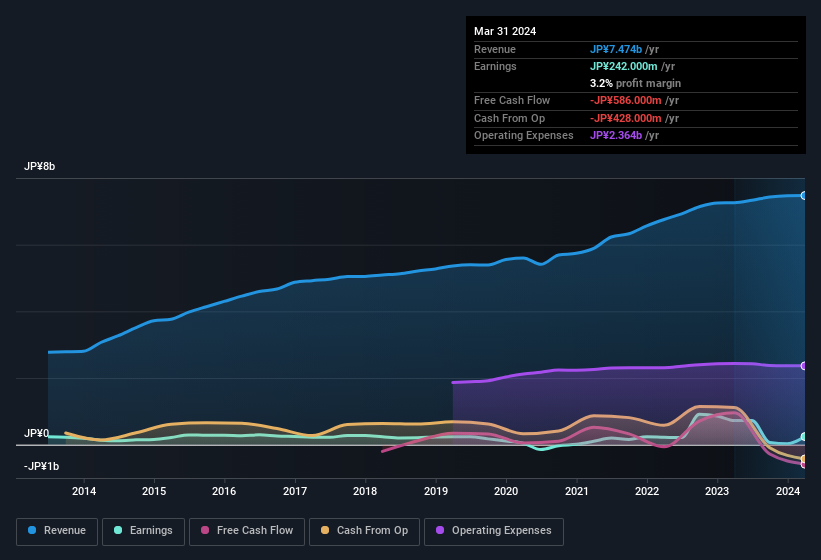- Japan
- /
- Consumer Services
- /
- TSE:2464
Aoba-BBT's (TSE:2464) Sluggish Earnings Might Be Just The Beginning Of Its Problems

The market wasn't impressed with the soft earnings from Aoba-BBT, Inc. (TSE:2464) recently. Our analysis has found some reasons to be concerned, beyond the weak headline numbers.
Check out our latest analysis for Aoba-BBT

Zooming In On Aoba-BBT's Earnings
Many investors haven't heard of the accrual ratio from cashflow, but it is actually a useful measure of how well a company's profit is backed up by free cash flow (FCF) during a given period. To get the accrual ratio we first subtract FCF from profit for a period, and then divide that number by the average operating assets for the period. This ratio tells us how much of a company's profit is not backed by free cashflow.
Therefore, it's actually considered a good thing when a company has a negative accrual ratio, but a bad thing if its accrual ratio is positive. While having an accrual ratio above zero is of little concern, we do think it's worth noting when a company has a relatively high accrual ratio. Notably, there is some academic evidence that suggests that a high accrual ratio is a bad sign for near-term profits, generally speaking.
Over the twelve months to March 2024, Aoba-BBT recorded an accrual ratio of 0.36. Unfortunately, that means its free cash flow was a lot less than its statutory profit, which makes us doubt the utility of profit as a guide. Even though it reported a profit of JP¥242.0m, a look at free cash flow indicates it actually burnt through JP¥586m in the last year. We saw that FCF was JP¥956m a year ago though, so Aoba-BBT has at least been able to generate positive FCF in the past. One positive for Aoba-BBT shareholders is that it's accrual ratio was significantly better last year, providing reason to believe that it may return to stronger cash conversion in the future. Shareholders should look for improved cashflow relative to profit in the current year, if that is indeed the case.
Note: we always recommend investors check balance sheet strength. Click here to be taken to our balance sheet analysis of Aoba-BBT.
Our Take On Aoba-BBT's Profit Performance
As we discussed above, we think Aoba-BBT's earnings were not supported by free cash flow, which might concern some investors. For this reason, we think that Aoba-BBT's statutory profits may be a bad guide to its underlying earnings power, and might give investors an overly positive impression of the company. But the good news is that its EPS growth over the last three years has been very impressive. The goal of this article has been to assess how well we can rely on the statutory earnings to reflect the company's potential, but there is plenty more to consider. With this in mind, we wouldn't consider investing in a stock unless we had a thorough understanding of the risks. For example, Aoba-BBT has 4 warning signs (and 2 which make us uncomfortable) we think you should know about.
This note has only looked at a single factor that sheds light on the nature of Aoba-BBT's profit. But there are plenty of other ways to inform your opinion of a company. Some people consider a high return on equity to be a good sign of a quality business. So you may wish to see this free collection of companies boasting high return on equity, or this list of stocks with high insider ownership.
New: Manage All Your Stock Portfolios in One Place
We've created the ultimate portfolio companion for stock investors, and it's free.
• Connect an unlimited number of Portfolios and see your total in one currency
• Be alerted to new Warning Signs or Risks via email or mobile
• Track the Fair Value of your stocks
Have feedback on this article? Concerned about the content? Get in touch with us directly. Alternatively, email editorial-team (at) simplywallst.com.
This article by Simply Wall St is general in nature. We provide commentary based on historical data and analyst forecasts only using an unbiased methodology and our articles are not intended to be financial advice. It does not constitute a recommendation to buy or sell any stock, and does not take account of your objectives, or your financial situation. We aim to bring you long-term focused analysis driven by fundamental data. Note that our analysis may not factor in the latest price-sensitive company announcements or qualitative material. Simply Wall St has no position in any stocks mentioned.
About TSE:2464
Flawless balance sheet with solid track record and pays a dividend.
Market Insights
Community Narratives



